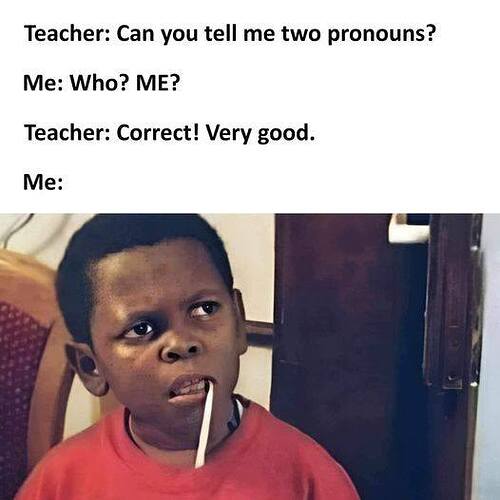The incorrect (and illogical) placement of the word ‘because’ in sentences over recent times is really doing my head in.
I fear that this is in the same category as your/you’re, the errant apostrophe and could of/have in that the battle is well and truly lost.
“Talk to” versus “talk about” is the one that really, REALLY boils my piiss on a daily basis…
When the word “however” is used without requisite punctuation.
Yeah, most likely. It’s just that to me, the his/he’s is really simple ![]()
You’re/your and they’re/their at least sound the same. His and he’s don’t.
They should sound different, but in some local dialects they’re spoken identically
Not in Australia though! Surely!
![]() sad but true
sad but true
I’ve heard it pronounced “he’s” in this country, but only very rarely.
Sometimes punctuation after that word is not required, however you try to argue otherwise.
But necessary commas are often omitted, and unwanted ones added.
I review reports written by others. I see 6-line sentences with no comma or other punctuation. Rather than edit those passages, I leave a comment challenging the report drafter to read it aloud, pausing only at the (absent) commas! They still don’t get it….
Agree. It’s a question of context and also taste. There is no rule requiring a comma in every case, but often a comma is appropriate.
Yeah but see my edit!
That’s true. Use such as “however you like it” requires no punctuation.
But I very often will read things where it’s being used to connect two contrasting statements. Where it really should be “; however,” or two sentences. But it is so often either “, however” or no punctuation at all.
That is a good technique. I used to tell my ESL students the same thing. Read your work out loud and where you pause to breathe, that is a place to add punctuation.
It’s an interesting subject. Some people when speaking pause more than others do and can transmit that to their writing. I don’t think that there is any kind of hard rule that can truly cover the correct use of commas. Dickens, for example, uses them liberally, and in general, I find that commas were, indeed, used more liberally than they are today. I’m guilty of it myself.
Older texts seem to have longer sentences with more commas (see the Puritans, whose sentences could go for most of a page). My theory is that this something to do with the way we form handwritten sentences as opposed to word processing (where you can go back and edit your expressions more easily).
Dickens also wrote very long sentences, some of them as long as a paragraph.
Your second sentence is a good example. Some may say the whole sentence without pausing. Others may pause before and after ‘when speaking’, and/or after ‘do’.
